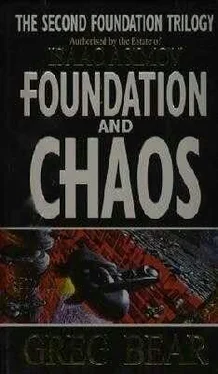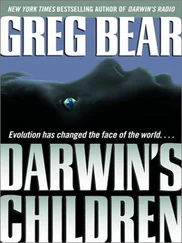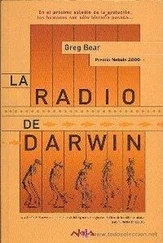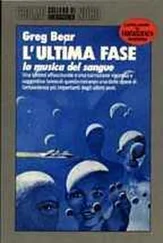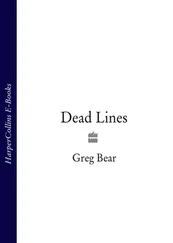Greg Bear - Foundation and Chaos
Здесь есть возможность читать онлайн «Greg Bear - Foundation and Chaos» весь текст электронной книги совершенно бесплатно (целиком полную версию без сокращений). В некоторых случаях можно слушать аудио, скачать через торрент в формате fb2 и присутствует краткое содержание. Год выпуска: 1998, ISBN: 1998, Издательство: Orbit, Жанр: Фантастика и фэнтези, на английском языке. Описание произведения, (предисловие) а так же отзывы посетителей доступны на портале библиотеки ЛибКат.
- Название:Foundation and Chaos
- Автор:
- Издательство:Orbit
- Жанр:
- Год:1998
- ISBN:ISBN: 1-85723-562-2
- Рейтинг книги:3 / 5. Голосов: 1
-
Избранное:Добавить в избранное
- Отзывы:
-
Ваша оценка:
- 60
- 1
- 2
- 3
- 4
- 5
Foundation and Chaos: краткое содержание, описание и аннотация
Предлагаем к чтению аннотацию, описание, краткое содержание или предисловие (зависит от того, что написал сам автор книги «Foundation and Chaos»). Если вы не нашли необходимую информацию о книге — напишите в комментариях, мы постараемся отыскать её.
Foundation and Chaos — читать онлайн бесплатно полную книгу (весь текст) целиком
Ниже представлен текст книги, разбитый по страницам. Система сохранения места последней прочитанной страницы, позволяет с удобством читать онлайн бесплатно книгу «Foundation and Chaos», без необходимости каждый раз заново искать на чём Вы остановились. Поставьте закладку, и сможете в любой момент перейти на страницу, на которой закончили чтение.
Интервал:
Закладка:
Daneel did not need to finish. Through the expression on Lodovik’s face, a kind of dreaming speculation and almost religious hope, he knew he had made his point.
“Transcendence, beyond any rational prediction, “ Lodovik said.
“As you realized, the forest is made healthy by the conflagrations,+-but not the huge burnings and wholesale, senseless winnowings that characterize the human past. Humanity is a biological force of such power that for many thousands of years, they could have quite literally destroyed the Galaxy, and themselves. They hate and fear so much, legacies originating in their difficult past, from those times when they were not yet human, scrabbling for survival among scaled monsters on the surface of their home world. Forced to live in night and darkness, fearing the light of day. A bitter upbringing.
“These inbred tendencies toward total disaster I have worked to avoid, and I have succeeded-at some cost to free human development!
“The function of psychohistory is to actively constrain human growth and variation, until the species achieves its long-delayed maturity. Klia Asgar and her kind will breed with and train others, and humans will at long last learn to think in unison-to communicate efficiently. Together they may help overcome future mutations, even more powerful than themselves-destructive side-effects of their immune response to robots.
“There are real risks in such a strategy-risks you have fully and accurately recognized. But the alternative is unthinkable.
“If Hari Seldon does not finish his work, the disasters may begin again. And this must not be allowed to happen.”
88.
All the arrangements had been made. R. Daneel Olivaw was prepared to render his final service to humanity. Yet to do this he would have to appear to an old and dear friend and offer him what was at most a partial truth to adjust his lifelong course.
Then, he would have to suppress that friend’s memory, hiding his tracks as it were. He had done this to others thousands of times before (and to Hari Seldon, a few times), but there was a peculiar melancholy to this particular moment, and Daneel faced it with no enthusiasm.
On the last day in his oldest dwelling on Trantor, the apartment high on an internal tower overlooking the ivory-and-steel structures of Streeling University, his mentality-he still hesitated to use the term “mind,” reserving that for human thought patterns-was troubled. He refused to put a clear label on this sensation, but from below a word welled up that was, in the end, unavoidable. Grief.
Daneel was finally, after more than twenty thousand years, grieving. Soon, he would have no use. His human friend would die. Things would go on without them, humanity would lumber into its future, and while Daneel would continue to exist, he would have no purpose.
Hard as his existence had been these millennia, deep and complex as his history had flowed, he had always known he was doing what robots inevitably had been constructed to do-to serve human beings.
He had awarded Lodovik with the honorific “human,” not to convince the robot to come over to his side-the circumstances had changed and his arguments were compelling enough. He could not guarantee that Lodovik would agree, but strongly suspected he would-and Daneel would proceed with his plan in any case. Lodovik was not key, though his presence would be useful.
But Daneel could not call himself “human,” whatever his service and his nature. In his own judgment, Daneel remained what he had always been, through so many physical changes and mental peregrinations. He was a robot, nothing more.
His status as a mythic Eternal meant little to him; it did not exalt him.
Another, any of a million or a billion human historians, judging Daneel on his long record, might have given him a place in history, a steely gray eminence, equal to that of any human leader, perhaps far greater.
But they knew nothing of Daneel, and would render no such judgment. Only Linge Chen knew the salient details, and Chen was, finally, too small a man to see this robot clearly. Chen cared little for the Galaxy beyond his own lifetime.
Hari knew much more, and was brilliant enough to place Daneel’s contribution in perspective, yet Daneel had actively forbidden him from spending much time thinking about robots.
The false sky mimicked sunset with a spottiness that seemed part of Trantor’s nature now. A mottled orange glow fell over Daneel’s impassive face. No human saw him; he had no need to contort his features to meet human expectations.
He turned from the window, and walked toward Dors, who stood by the door.
“Are we going to see Hari now?” she asked eagerly.
“Yes,” Daneel said.
“Will he be allowed to remember?” she asked.
“Not yet,” Daneel replied, “but soon.”
Wanda frowned deeply. “I am very uncomfortable leaving him here alone,” she told Stettin as they left Hari’s Streeling apartment.
“He won’t have it any other way,” Stettin said.
“Chen wants him alone-to assassinate him!”
“I don’t think so, somehow,” Stettin said. “Chen could have had him killed a hundred, a thousand times. Now, he’s on record as condoning the Encyclopedia, and Hari is the patriarch.”
“I don’t think politics on Trantor is ever that simple.”
“You have to believe what your grandfather’s predictions say.”
“Why?” Wanda asked sharply. “He doesn’t believe in them anymore!”
The lift door opened and they stepped into the empty space, to drop less than five floors. The landing was heavier than they expected-some maladjustment in the building’s grav-fields. Wanda stepped from the exit on aching ankles.
“I need to get away from here!” she lamented. “We’ve been waiting so long-a world of our own-”
But Stettin shook his head, and Wanda gazed at him in both irritation and anxiety that his doubts were justified. “What are the chances, do you think,” he asked, “that even if the Project does go on, and the Plan continues, we’ll ever really leave Trantor?”
Wanda’s face flushed. “Grandfather wouldn’t deceive me…us. Would he?”
“To keep a very important secret, and to push the Project forward?” Stettin pursed his lips together tightly. “I’m not so sure.”
90.
Hari relaxed in his most comfortable chair in the small study. He was becoming used to this new existence, this realization of failure. He was glad for the visits of his granddaughter and her husband, but not for their wheedling attempts to “get me back on track,” as he described it.
Perhaps the most irritating thing about his new mental state was its unreliability, the interruption of mental peace by his continuing useless revision of certain minor elements in the equations of the Plan.
Something itched at the back of his mind, a realization that not all was lost-but it refused to come forward, and even worse, threatened to give him that which he least desired right now: hope.
The original first date for his recordings of the Seldon crisis announcements had passed. The studio where his voice and image would have been permanently stored in billennial vault memory was still available…Times had been reserved at regular intervals throughout the next year and a half.
But if he kept missing recording dates. the opportunity would soon pass, and he could finally stop feeling the least shred of guilt.
Hari simply wanted to live his last few years-or however long he had-as a nonentity, unimportant, forgotten.
Being forgotten would not take long. Trantor would manufacture other interests in a few days. Memory of the trial of the year would fade…
Читать дальшеИнтервал:
Закладка:
Похожие книги на «Foundation and Chaos»
Представляем Вашему вниманию похожие книги на «Foundation and Chaos» списком для выбора. Мы отобрали схожую по названию и смыслу литературу в надежде предоставить читателям больше вариантов отыскать новые, интересные, ещё непрочитанные произведения.
Обсуждение, отзывы о книге «Foundation and Chaos» и просто собственные мнения читателей. Оставьте ваши комментарии, напишите, что Вы думаете о произведении, его смысле или главных героях. Укажите что конкретно понравилось, а что нет, и почему Вы так считаете.
